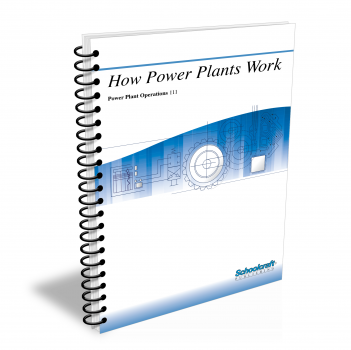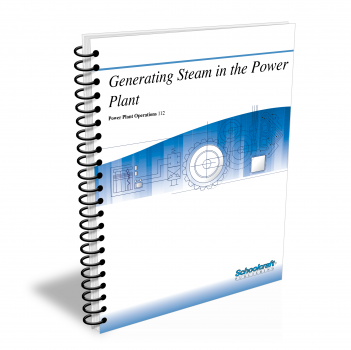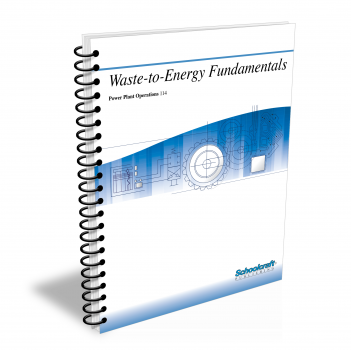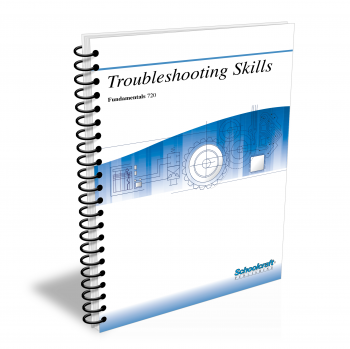Using Steam in the Power Plant
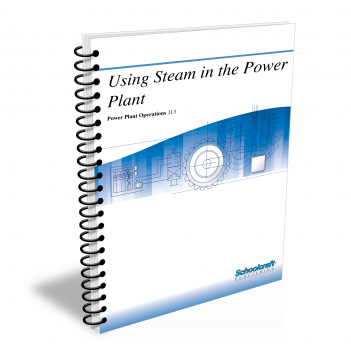
Course Number: 113
The Using Steam in the Power Plant textbook covers how to conserve energy in turbines, auxiliaries, electric power generation, and air-conditioning systems.
Does your curriculum require additional topics not included in this textbook? Build a customized version of the Using Steam in the Power Plant textbook below.
Recommended Contact Hours – 10
Preview a Chapter
Available Supporting Material
- Table of Contents
- Exam Copies
- Suggested Titles
Table of Contents
Chapter 1: Turbines
Topics: Types; Operating principles; Condensers; Heat rejection; Thermal pollution; Boiler, turbine, and generator efficiency
Learning Objectives:
- Name the five main parts of a steam turbine system and explain the function of each.
- Contrast the operating principle of an impulse turbine and a reaction turbine.
- Define the terms tandem compound and cross compound.
- Explain how a condenser improves turbine efficiency.
- Explain how an overspeed trip is activated.
- List three causes of turbine rotor vibration.
- Name the main cause of bearing failure in a turbine.
Chapter 2: Boiler Instrumentation, Controls, and Safety
Topics: Boiler Instrumentation, Controls, and Safety - Pressure, flow, and temperature gauges; Manometers; Water glasses; Combustion and feedwater control; Safety devices
Learning Objectives:
- Define the term variable.
- Describe the three main classes of boiler instruments.
- List the four variables on which boiler instrumentation usually provides data.
- Name the four common types of pressure gauges, and describe the characteristics and uses of each.
- Name and describe the three types of flowmeters commonly used in power plants.
- Name and describe the four types of temperature gauges commonly used in power plants.
- Describe the uses for gauge glass assemblies in power plant instrumentation.
- Explain the purpose of combustion control systems and describe the three basic kinds.
- Describe the three kinds of feedwater regulators.
- Explain the importance of safety valves and flame safety devices in power plants.
Chapter 3: Electrical Power Fundamentals
Topics: Power in DC circuits; AC current; Generators; Phase difference; Power factor; Three-phase systems; Transformers; Metering principles
Learning Objectives:
- Explain the basic principles of electricity and electric power, including the significance of Ohm's Law
- Identify the parts of an electrical circuit and describe the function of each part
- Contrast series and parallel circuits
- Explain the difference between the two main groups of generators and further describe each group in terms of its sources of mechanical power
- Define phase difference and power factor, and describe a three-phase system
- Explain the function of a transformer
- Describe the variety of metering instruments used to measure the value of electric energy
- Explain the purpose of an electric distribution system, and list the three main kinds
- Name four kinds of protective equipment used in power systems
Chapter 4: Electrical Systems Analysis
Topics: Demand considerations, analysis, and cost; Power factor correction; Synchronous motors; Transformer losses; Maintenance
Learning Objectives:
- Explain the purpose of a line diagram.
- List the four kinds of charges normally found on a power bill.
- Define peak demand.
- Calculate a plant's load factor.
- Describe the steps involved in performing demand analysis.
- Calculate demand cost and explain the effect of short demand peaks on billing.
- Define power factor and explain how it is calculated, what causes it to be low, and how it can be improved.
- List the types of power losses that occur in transformers and describe the cause of each.
- Explain how to maintain protective devices, cable systems, and generators and motors.
- Explain the importance of energy conservation in power plants.
Chapter 5: Air-Conditioning Systems
Topics: Basic cycle; Compressors; Condensers; Evaporators; Metering devices; Accessories; Controls; Air handling; Maintenance practices
Learning Objectives:
- Define relative humidity and explain how it is measured
- Define the terms refrigeration ton and refrigeration effect
- used in air-conditioning systems
- Name and describe the three kinds of condensers used in air-conditioning systems
- List the metering devices used in an air-conditioning system and explain their uses
- List the accessories and controls that are found in an air-conditioning system and state their purposes
- Describe the air-handling system and its components
- Explain how to measure velocity pressure and static pressure
- Explain several maintenance practices that will improve the efficiency of an air-conditioning system.
Request Exam Copies
Exam Copies
Ready to see a copy of our textbooks? After selecting which textbooks you’d like to review for your course, you can submit your request by either logging in or creating an account so we know where to ship your exam copies. A representative from Schoolcraft will contact you to confirm and finish processing your request.
Exam copies are always free and yours to keep.
Selected Exam Copies
none selected
* Maximum of five copies can be ordered
